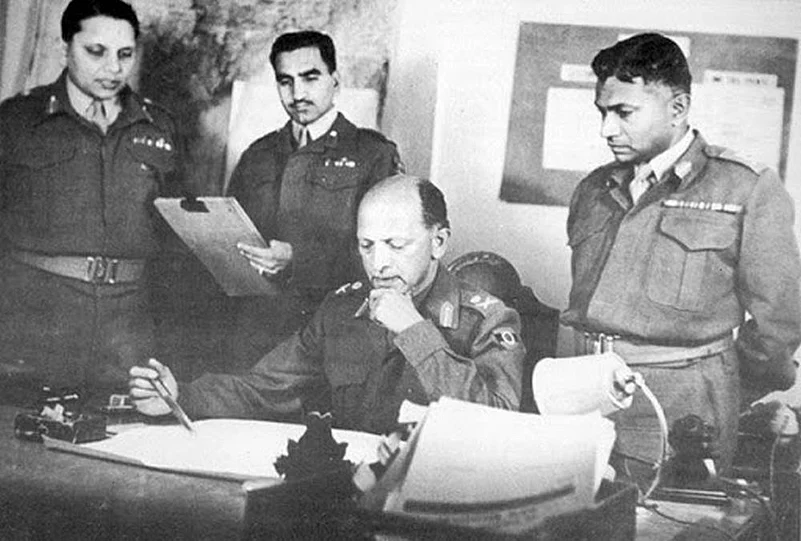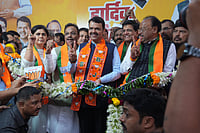An assassination attempt was reportedly made on the then commander-in-chief of the Indian army, General Cariappa, in 1950 and 6 persons were sentenced to death, revealed a report of the US Central Intelligence Agency (CIA) that was declassified recently.
“An attempt to assassinate General Cariappa, the commander-in-chief of Indian Army, was made during the General’s recent inspection tour of East Punjab,” said the explosive piece of CIA declassified report, titled “Rift in Officers corps of the Indian Army”, filed on June 12, 1950 that was hitherto unknown to the public.
The Punjab province was divided in two --- East and West Punjab -- after the partition of British India. The eastern part, which became part of India, was renamed as the state of Punjab in 1950 after a lot of bloodshed. It was Cariappa’s responsibility to split the military assets between India and Pakistan as the eastern army commander before he became commander in chief, a post which was later renamed as Chief of Army Staff (COAS).
The report is among some 13 million declassified documents, which the CIA have released online. The report was declassified in accordance with the US government’s 1995 executive order that allows automatic declassification of nonexempt historically valuable records 25 years or older.
The report was marked “Confidential”, the agency’s second highest security classification depending on the level of secrecy to be accorded.
What’s jaw-dropping in the report is that six people were sentenced to death for making an attempt on the life of Field Marshal K N Cariappa, who took over as the first Indian Commander in Chief of the Indian Army from General Roy Bucher, a British Army Officer, on January 15, 1949. Nobody seems to know it, not even the internet.
“Six persons have been sentenced to death in connection with the plot; several high army officers are believed to be involved,” says the report without mentioning if they were army officers or outsiders.
But the report is not whether they were actually sent to the gallows.
Without going into whodunit, the second paragraph by the informer moves on to report about the parochial divide among the officers and accuse the Rashtriya Swayamsewak Sangh (RSS) of fomenting unrest among officers.
“Cariappa as South Indian is resented by the Sikh officers of the Indian Army. The RSS (Rashtriya Swayamsewak Sangh) is capitalizing on the North-South split among army officers, persuading Sikh officers, whom informant considers treacherous and unreliable, to spread dissension. Officers from Travancore (later Kerala), Madras and Maharashtra are invariable loyal to General Cariappa”.
The assassination attempt report is preposterous, said Cariappa’s son Air Marshal Nanda Cariappa (retd).
“I think it’s implausible, I’ve never heard about it, quite honestly, and nobody I know has ever heard about it. In 1950, one year into being the commander in chief, he was in good terms with the politicians...I can’t think of anybody who would want to bump him off,” said Cariappa’s son Air Marshal Nanda Cariappa(retd), who retired from the Air Force 20 years ago.
The report of death penalty for assassins sounds incredulous to many experts.
“I doubt if anyone was sentenced to death anytime then,” said Manoj Joshi, security analyst and Distinguished Fellow at ORF.
“It’s true that there were tensions between Sikh and non-Sikh officers at that timearising out of court martial of Brigadier Pritam Singh and they became a feature in the army for quite some time,” said Joshi. There is still resentment that three outstanding generals of the 1950s and 1960s – Lt Gen Kulwant Singh, Lt Gen Harbhaksh Singh and Lt Gen JS Aurora -- failed to make it as Army chief.
“Parochialism in the army has been around for a while. Even now people say that General Dalbir Singh was only encouraging Gurkha officers and General VK Singh was only encouraging officers from the Rajput regiment. These kind of tensions and parochialism are always there in the army.”
“But to say that someone made an attempt on Cariappa’s life and were sentenced to death is complete cock-and-bull.”
“The CIA, which was created in 1947, had zero experience and little knowledge of India and this could simply be some bar room gossip,”said Joshi
(The writer tweets as @anoophilip)
















